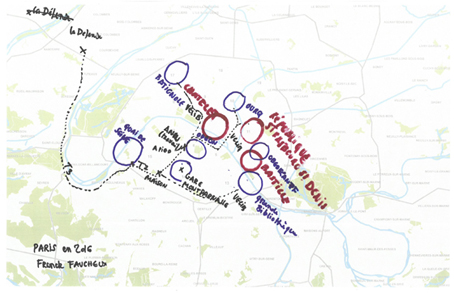Vulnerability by Design: Borders, Urban Borders
- Start Page
- Calendar
- Vulnerability by Design: Borders, Urban Borders
A seminar series on the ethics and politics of design engagement across borders, bodies and environments.

A personal map of fear and safety, Paris 2016. Image: Jess Myers.
Welcome to the second event in this series of public seminars where Jess Myers and Nazem Tahvilzadeh, together with Mahmoud Keshavarz will discuss how cities are governed by different bordering practices from racial profiling and policing industry to privatisation and gentrification. This includes a discussion about the conditions of engagement with urban injustices in a neoliberal time.
Vulnerability by Design explores the intersections of what forms of human, animal and environmental vulnerabilities are engaged, resisted and/or produced by design and designing and how the vulnerability, partiality and limits of design and designing are exposed through various tactics and techniques. It poses an urgent question: what methodologies and knowledge are required to recognize the ethics and politics of design engagement with our and others’ vulnerable conditions? Through three main themes of borders, bodies and environments, these questions and concerns will be highlighted and discussed in a series of seminars with Swedish and international guests.
In the recent decade there has been a proliferation of design practices that engage with the vulnerability of different individuals, groups and beings from humans to animals and environments. These design practices often aim to overcome or resist the vulnerable conditions in which they intervene. In doing so, they often rely on one of the main capacities of designing, in speculating, imagining or envisioning possible relations, arrangements and configurations between existing situations and possible futures.
In these processes, however, there are many assumptions and ambiguities around what constitutes a status as vulnerable which calls for a designerly intervention. Who and under what conditions claims the less vulnerable position from which others can be approached as more vulnerable and in need of a better design? Is design merely a tool separated from the conditions of vulnerability, which it seeks to address? Is there a risk that through engaging with such conditions, the act of designing would generate other vulnerabilities often not recognized by the designers? Furthermore, how does materiality, partiality and limits of designing make design also vulnerable in its own way?
Jess Myers is a New York based architect writer, podcaster, and strategist focusing on urban planning and architecture. She is the editor of a book series on social justice, Taking Freedom, which will be published through a collaboration between the Service Employees International Union, Sage Publications, and the Community Innovators Lab at the Massachusetts Institute of Technology. Her podcast Here There Be Dragons takes an in-depth look at the intersection of identity politics and security policy in public space through the eyes of city residents. In the past, she has worked in diverse roles—archivist, researcher, analyst—in both New York and Paris, and within cultural practices that include Bernard Tschumi Architects.
Nazem Tahvilzadeh is a researcher at Urban and regional studies at the Royal Institute of Technology in Stockholm. He writes about democracy and urban politics in a context of rapidly increasing inequalities. He is in general concerned with issues of power, democracy and policy regarding contemporary urban development politics in cities. He has written about participatory governance, citizens’ participation, social movements and sustainable development policies in planning and the situation of exclusion and marginalization in urban peripheries. A significant part of his research is conducted by ethnographic and co-productive methodologies together with social movements and with policy and planning administrators.
Vulnerability by Design is part of a new public events programme at Iaspis, critically looking at how socially engaged practices within design, craft and architecture may engage with urgent societal issues. The programme unfolds through various themes and formats from the autumn 2019. Vulnerability by Design is developed by Iaspis, the Swedish Arts Grants Committee’s international programme for Visual and Applied Artists, through Project Manager Magnus Ericson and together with Mahmoud Keshavarz, researcher at the Engaging Vulnerability Programme, the Department of Cultural Anthropology and Ethnology, Uppsala University.
For further questions please contact Magnus Ericson: me@iaspis.se

